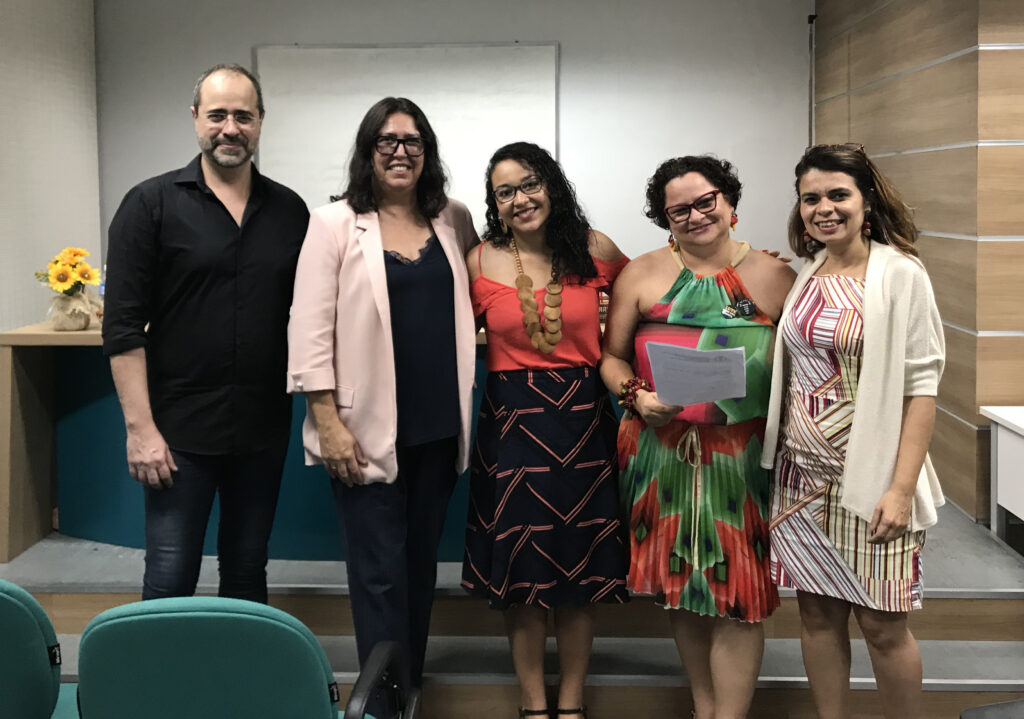By Marcie Kamb, February 24, 2021
The Center on Education and Training for Employment (CETE) is proud to host Vivian Martins, a doctoral candidate in Education from the State University of Rio de Janeiro (UERJ), Brazil, as a Visiting Scholar until July of 2021. She is currently a professor of Distance Education and Educational Technologies of the Federal Institute of Education, Science and Technology of Rio de Janeiro (IFRJ). Martins is a member of the Teaching and Cyberculture research group at UERJ, and is using her time at CETE to continue her research related to the shift in online learning to a mobile format. Her advisor is Dr. Edmea Santos, Professor at the Universidade Federal Rural do Rio De Janeiro (UFRRJ). She is the leader of the Teaching & Cyberculture research group. This line of research interests Martins because Brazil has such a large population, and technology is not part of educational daily life as it is in the United States. Mobile learning may be the only way for students to assess the internet which leads to an increased emphasis on research related to educational technology to comprehend the pedagogical practice.

“Teachers in the United States have more access to technology and therefore are much more comfortable using it in their classrooms. In Brazil, teachers may have never used technology to teach before, and the pandemic forced them to learn this option with no notice at all which was incredibly difficult. But technology is really the only way to continue to progress the students, so even though it wasn’t under the best circumstances, it allowed them to teach in a new way.” Martins states.
Martins has also enjoyed CETE’s work in the social justice space through the Racial Equity, Justice and Diversity (REDI) Movement, and appreciates the consideration of encouraging educators to understand a diverse range of backgrounds and experiences. “We have to be able to comprehend diversity and that people learn in different ways. Understanding how to include and improve technologies through different contexts needs to be a priority and educators are the ones that can do that work.”
The pandemic posed many challenges for teachers everywhere but caused increased stress for those in countries where technology is often a luxury. Martins reflects on the forced abrupt shift to virtual learning in Brazil. “How do we stay focused together on bringing technology to the classroom? I know the education during a pandemic was not a perfect start, and in Brazil some classrooms are similar to how they were in the olden days without modern amenities. A lot of the educators experienced the trauma of being thrown into using technology and may not want to use it long-term. But, for others this is a new path and perspective.”

What Brazil lacks in technology; they make up for in terms of no-cost education for all. Brazil provides free public education through all levels, including the university level. School books, supplies, transportation, and food are also offered at no-cost to the public.
“Schools belong to everyone. However, there are challenges with this model of public education because of the lack of resources and absence of public policies. There are many people that don’t see themselves in the space of a college education, even though they have free access to it. There are also very difficult exams at the end of high school, and often the students with access to more financial resources are the ones who are able to pass the exams and continue their academic journey.” Martins said.
Many new research questions are developed and investigated during the time here with CETE, and Martins works to uncover new insights alongside Dr. Ana-Paula Correia, Associate Professor of Learning Technologies and Director of CETE, and members of her research group in Learning & Experience Design. Martins is determined to expand upon her ten years of professional expertise in the areas of online education, education and cyberculture, and educational technologies. She is thoroughly enjoying the research opportunities and collaborations among the members of CETE, is impressed by the beauty and grandeur of the buildings on the main campus of The Ohio State University.
July 2021 will be here before she knows it, and she will be sad to see Columbus, Ohio appear smaller as the plane takes her back to Rio de Janeiro. Martins will leave with a renewed passion to help students, teachers, and the community make the most of educational technology, and has a range of new experiences to help inform her scholarship in this field. As for CETE, we feel lucky to have served as a stop along the way.
